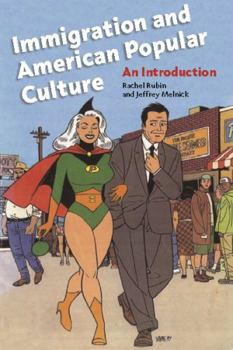Immigration and American Popular Culture: An Introduction
(Part of the Nation of Nations: Immigrant History as American History Series)
Select Format
Select Condition 
Book Overview
A unique study that hones in on the cross-section and interdependency of immigration and American cultural production
How does a 'national' popular culture form and grow over time in a nation comprised of immigrants? How have immigrants used popular culture in America, and how has it used them? Immigration and American Popular Culture looks at the relationship between American immigrants and the popular culture industry in the twentieth century. Through a series of case studies, Rachel Rubin and Jeffrey Melnick uncover how specific trends in popular culture--such as portrayals of European immigrants as gangsters in 1930s cinema, the zoot suits of the 1940s, the influence of Jamaican Americans on rap in the 1970s, and cyberpunk and Asian American zines in the1990s--have their roots in the complex socio-political nature of immigration in America. Supplemented by a timeline of key events and extensive suggestions for further reading, Immigration and American Popular Culture offers at once a unique history of twentieth century U.S. immigration and an essential introduction to the major approaches to the study of popular culture. Melnick and Rubin go further to demonstrate how completely and complexly the processes of immigration and cultural production have been intertwined, and how we cannot understand one without the other.Format:Paperback
Language:English
ISBN:0814775535
ISBN13:9780814775530
Release Date:December 2006
Publisher:New York University Press
Length:302 Pages
Weight:0.96 lbs.
Dimensions:1.2" x 6.2" x 9.1"
Customer Reviews
1 rating
From Rico to Rosalita
Published by Thriftbooks.com User , 18 years ago
One of the most important points Rachel Rubin and Jeffrey Melnick make in their book Immigration and American Popular Culture is that migration patterns aren't random. People don't just start spilling out from their countries for no reason, heading to various destinations with no purpose. Rubin and Melnick use a lot of movies and plays (their chapter on West Side Story and The Young Savages is excellent) to show how American pop culture changed the immigrants, how the immigrants changed the pop culture, and how the pop culture reflected the immigrants' lives back to them and to the society at large. In some ways pop culture told truths about new immigrants, but in other ways pop culture (sometimes with the connivance of the immigrants themselves) told lies. One of the creators of West Side Story said he'd never been poor and had never met a Puerto Rican. But a lot of the producers of the show were gay. Maybe they were talking about more than one kind of outsider. (At risk of sounding like one of Jerry Seinfeld's jokes, there's nothing wrong with someone from one outsider group recognizing the hardships and pain felt by another.) Another point Rubin and Melnick make is how immigrant groups that were "working toward whiteness" engaged in a "masquerade" that was similar to the blackface minstrelsy that went back to post-Civil War Reconstruction. Sometimes the "blacking up" was relatively subtle, like the Jewish Edward G. Robinson playing the Italian Rico in Little Caesar. Sometimes it wasn't so subtle, like Al Jolson on his knees in blackface singing "Mammy." Some pop culture critics say immigrants used "blackface" (either literal paint or just trying to adopt black "cool") as a way of identifying WITH blacks, whereas some immigrant performers wanted to mock blacks and show a distinction between themselves and blacks. Another interesting book on this subject that just came out is Black Like You by John Strausbaugh. Strausbaugh compares the generation of immigrant teenagers that made the song "Jump Jim Crow" a hit in the late nineteenth century in New York to the first generation of rock and rollers. Well, Elvis just took black music and made it okay for white kids to dance to. I can't help think that whites are always going to give the "appropriators" of black culture more credit for respecting that culture than blacks can, or think they should. Bing Crosby supposedly supported black artists more than anyone with his influence (read White Christmas: The Story of a Song by Jody Rosen), but watching him and Marjorie Reynolds in blackface in Irving Berlin's Holiday Inn makes you cringe. Another Irving Berlin song goes: "Let me sing of Dixie's charms/Of cotton fields and Mammy's arms/And if my song can make you homesick/I'm happy." The trouble is, that home never existed. By the way, Trent Lott just announced he's running for the position of minority whip in the Senate. Looks like he'll get it, too. What he said about Strom Thurmond - - tha






